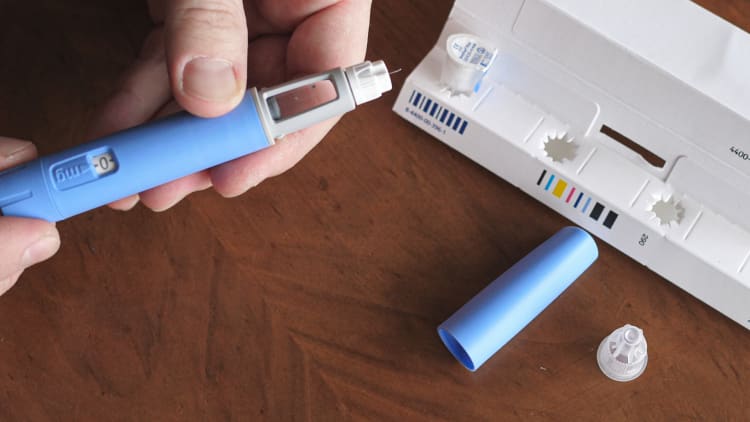The blockbuster diabetes drug Mounjaro is more effective for weight loss than another highly popular diabetes treatment, Ozempic, in overweight or obese adults, according to a large analysis of real-world data published Monday.
Patients taking Eli Lilly‘s Mounjaro were significantly more likely to lose 5%, 10% and 15% of their body weight overall and saw larger reductions in body weight after three months, six months and a year compared with those on Novo Nordisk‘s Ozempic in the study by Truveta Research. The firm compiles and analyzes patient data from a collective of health-care systems.
The results from the study, which is not yet peer-reviewed, come as both drugs and similar treatments approved for weight loss soar in demand in the U.S. for their ability to help patients shed unwanted pounds over time. Mounjaro and Ozempic are only approved for the treatment of Type 2 diabetes, but many people use the weekly injections off-label to lose weight.
A spokesperson for Eli Lilly said the company does not promote or encourage off-label use of any of its medicines and noted that the new study was not sponsored by the drugmaker.

A Novo Nordisk spokesperson similarly said that the company was not involved in the study. They also said the study does not consider that Ozempic is administered at slightly lower doses than its weight-loss drug counterpart, Wegovy. Both drugs contain the active ingredient semaglutide.
Meanwhile, Mounjaro and another version of the drug approved for weight loss called Zepbound are the same medicine with the same dosage level, the spokesperson added.
Previous head-to-head studies have similarly suggested that Mounjaro is more effective than Ozempic for weight loss and controlling blood sugar in adults with Type 2 diabetes.
But Monday’s study suggests that Mounjaro has an edge over Ozempic in a real-world setting, specifically among adults who are overweight or obese. Notably, head-to-head clinical trials in that population are not yet available, according to Truveta Research.
Eli Lilly is pitting Zepbound and Wegovy in an ongoing clinical trial in obese or overweight patients. But results won’t be released until 2025.
“We’ve been able to compare the head-to-head efficacy of these two important medications for weight loss in advance of randomized clinical trials,” said Dr. Nick Stucky, an author of the study and vice president of Truveta Research, in a statement. “This study can help to inform patient care and outcomes today, not months from now.”
Study results on Mounjaro and Ozempic
Truveta Research specifically examined health-care data on roughly 18,000 adults who are overweight or obese and first started taking Mounjaro or Ozempic between May 2022 and September 2023. Nearly 52% of those patients had Type 2 diabetes.
Researchers found that patients taking Mounjaro were three times more likely to lose 15% of their weight than those on Ozempic. Patients on Mounjaro were also 2.6 times more likely to achieve 10% weight loss and 1.8 times more likely to lose 5% of their weight.
Those taking Mounjaro also experienced “significantly larger reductions” in body weight at specific time points, according to Truveta Research.
At three months, patients on Mounjaro lost 5.9% of their weight, while those on Ozempic lost 3.6%. At six months, people taking Mounjaro lost 10.1% of their weight, while patients on Ozempic lost 5.9%. And at one year, those on Mounjaro lost 15.2% of their weight, while those on Ozempic lost 7.9%.
Truveta Research also found that patients without Type 2 diabetes lost more weight than those with the condition. But the differences in effectiveness between Mounjaro and Ozempic were similar in both populations.
Rates of adverse gastrointestinal events were similar between patients taking Mounjaro and Ozempic.
The big difference between the weekly injections
Mounjaro and Ozempic, along with their weight loss counterparts, are both weekly injections that change the way patients eat and lead to decreased appetite by mimicking certain hormones in the gut.
Ozempic and Wegovy only mimic one hunger-regulating hormone called glucagon-like peptide-1, also known as GLP-1, which increases the feeling of fullness and lowers blood sugar levels.
Meanwhile, Mounjaro and Zepbound mimic GLP-1 and another hormone in the gut called glucose-dependent insulinotropic polypeptide, or GIP.
The dual approach means that Mounjaro and Zepbound have an enhanced effect on regulating appetite and blood sugar levels, which some experts say could potentially lead to more significant weight loss than medications only targeting GLP-1.
In Eli Lilly’s late-stage study of more than 2,500 adults with obesity but not diabetes, those taking 5 milligrams of Zepbound for 72 weeks lost about 16% of their body weight on average. Higher doses of the drug were associated with even more weight loss, with a 15-milligram dose leading to 22.5% weight loss on average.
More than 2 in 5 adults have obesity, according to the National Institutes of Health.
About 1 in 11 adults have severe obesity.
Don’t miss these stories from CNBC PRO:

